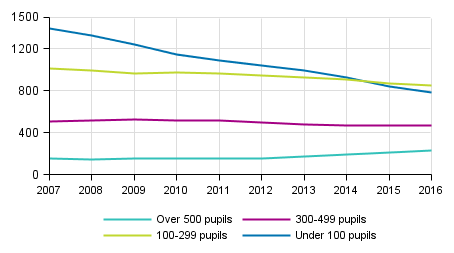Published: 14 February 2017
Number of educational institutions fell further, comprehensive schools bigger than before
According to Statistics Finland’s register of providers of education and register of educational institutions, there were 737 active providers of education and 3,395 educational institutions in which 1.85 million students pursued studies at the end of 2016. There were 2,339 active comprehensive schools, 789 of which had under 100 pupils. The number of comprehensive schools has decreased by 24 per cent in ten years.
Number of comprehensive schools by number of pupils 2007–2016

There were 2,339 active comprehensive schools which had 532,700 pupils. Special education schools at the comprehensive school level numbered 75 and they had 4,400 pupils. A total of 72 comprehensive schools or comprehensive school level special education schools were closed down or merged with another educational institution. Of these, 10 were educational institutions with under 20 pupils, 17 had between 20 and 49 pupils while 35 had at least 50 pupils. The number of closures was the highest in the region of South Ostrobotnia.
Comprehensive school pupils are studying in bigger educational institutions than before. In ten years, the number of comprehensive schools with under 100 pupils has declined by 43 per cent, while the number of comprehensive schools with over 500 pupils has grown by 54 per cent. In 2007, the number of comprehensive schools with over 500 pupils was 151, whereas at the end of year 2016 the number was 233. The share of comprehensive schools of over 500 pupils in all comprehensive schools has grown by 10 percentage points over the same period.
Educational institutions of the school system and numbers of students by type of educational institution in 2016
| Type of educational institution | Number | Change from previous year 1) | Students 2) |
| 11 Comprehensive schools | 2 339 | -58 | 532 700 |
| 12 Comprehensive school level special education schools | 75 | -10 | 4 400 |
| 15 Upper secondary general schools | 342 | -8 | 112 200 |
| 19 Comprehensive and upper secondary general level schools | 41 | - | 27 800 |
| 21 Vocational institutes | 99 | -3 | 164 500 |
| 22 Special needs vocational institutes | 6 | - | 5 100 |
| 23 Specialised vocational institutes | 27 | -2 | 29 900 |
| 24 Vocational adult education centres | 23 | -3 | 30 200 |
| 28 Fire, police and security service institutes | 1 | - | 300 |
| 29 Military vocational institutes | 6 | - | |
| 41 Universities of applied sciences | 26 | - | 144 400 |
| 42 Universities | 14 | - | 158 700 |
| 43 Military academies | 1 | - | 900 |
| 61 Music schools and colleges | 86 | - | 65 200 |
| 62 Sports institutes | 14 | - | 5 700 |
| 63 Folk high schools | 74 | -2 | 18 500 |
| 64 Adult education centres | 183 | -2 | 482 400 |
| 65 Study circle centres | 12 | - | 34 900 |
| 66 Summer universities | 20 | - | 28 100 |
| 99 Other educational institutions | 6 | - | 500 |
| Total | 3 395 | -88 | 1 846 400 |
2) The data on the number of students are mainly as on 20 September 2016 and include the number of all students in educational institutions belonging to the type of educational institution independent of the level of education. Data on the number of students at universities, universities of applied sciences, vocational institutions and upper secondary institutions is preliminary.
The number of providers of education was 11 lower than in 2015. Of the providers of education, 46 per cent were municipalities or joint municipal authorities, six per cent were central government units and 45 per cent private. The remaining three per cent of the providers of education operated in the Region of ┼land. In 2016, one new provider of education was added to the register of providers of education. The number of educational institutions was 88 lower than the year before.
According to preliminary data for 2016, there were 1.29 million students in education leading to a qualification or degree. These data derive from education statistics compiled by Statistics Finland. Data on the subject matter are published on Statistics Finland’s websites on the statistics on students and qualifications of educational institutions, pre-primary and comprehensive school education, upper secondary general education, vocational education, university of applied sciences education, university education and adult education of educational institutions.
Source: Education Statistics. Statistics Finland
Inquiries: Mika Witting 029 551 3571, koulutustilastot@stat.fi
Director in charge: Jari Tarkoma
Publication in pdf-format (221.2 kB)
Updated 14.2.2017
Official Statistics of Finland (OSF):
Providers of education and educational institutions [e-publication].
ISSN=1799-5825. 2016. Helsinki: Statistics Finland [referred: 5.3.2026].
Access method: http://stat.fi/til/kjarj/2016/kjarj_2016_2017-02-14_tie_001_en.html

